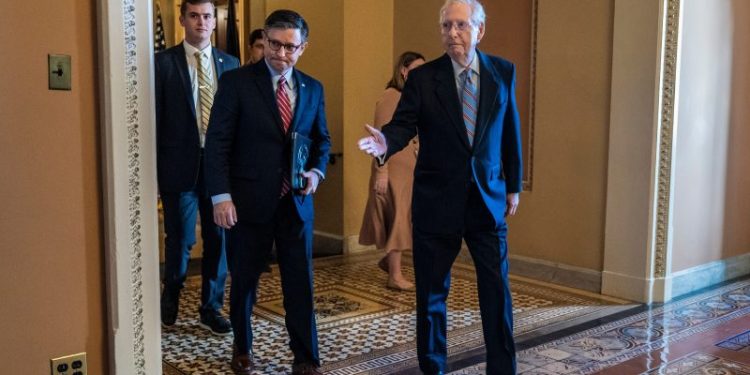The House GOP is facing a growing dilemma regarding the immigration bill that has caused tension and division within the party. As the issue of immigration continues to be a contentious topic, the Republican Party is struggling to find a unified approach that satisfies both its conservative base and the broader objectives of immigration reform.
At the heart of the GOP’s struggle is the division between hardline conservatives who prioritize border security and strict immigration enforcement, and more moderate members who recognize the need for a more comprehensive and compassionate approach. This divide has only intensified in recent years, fueled by the Trump administration’s hardline immigration policies.
The dilemma became particularly evident in late June when a bipartisan group of senators introduced a comprehensive immigration bill, known as the U.S. Citizenship Act of 2021, which seeks to provide a pathway to citizenship for millions of undocumented immigrants, improve border security, address root causes of migration, and reform the legal immigration system. While the legislation faces an uphill battle in the Senate, it has put pressure on House Republicans to reckon with their own position on immigration.
The dilemma for the House GOP lies in the fact that taking a hardline stance on immigration may further alienate Hispanic and immigrant communities, whose support Republicans are increasingly vying for. According to some political analysts, the GOP risk losing key battleground states and future elections if they fail to adopt a more inclusive and compassionate approach to immigration.
However, the conservative base also demands a tougher stance on immigration, viewing it as a matter of national security and economic preservation. For many conservatives, amnesty for undocumented immigrants is seen as a betrayal of their values and a reward for breaking the law. This sentiment has been amplified by media outlets and conservative commentators who frame immigration as a threat to national identity and economic stability.
Some House Republicans have attempted to navigate this dilemma by proposing alternative immigration bills that emphasize border security without providing a pathway to citizenship. These proposals are often framed as more realistic and achievable, given the current political landscape. However, such bills risk being dismissed as insufficient by immigration advocates and may further strain GOP’s relationship with Hispanic voters.
The situation is further complicated by the growing influence of the far-right in the Republican Party. Some members, aligned with the ideology of former President Trump, are vehemently opposed to any compromise on immigration and prioritize a strict enforcement-only approach. This faction within the party exerts significant pressure on more moderate Republicans and could further hinder attempts to find a consensus.
To address this growing dilemma, House Republicans must engage in thoughtful and constructive dialogue within the party to bridge the divide. It will require finding common ground and being open to compromise, all while keeping in mind the broader objectives of immigration reform. This will not be an easy task, but it is essential if the GOP aims to avoid further alienating key voter bases and strengthen its chances in future elections.
Moreover, the House GOP should also consider the changing demographics of the United States and the shifting attitudes towards immigration. Millennials and Gen Z, who will be key voting demographics in the coming years, tend to be more inclusive and supportive of immigration reform. If the Republican Party does not adapt its position to reflect these changing dynamics, it risks losing influence and relevance among younger generations.
In conclusion, the House GOP faces a challenging dilemma regarding the immigration bill. Balancing the demands of their conservative base with the growing need for comprehensive immigration reform poses a significant challenge. The party must navigate this divide carefully, finding common ground and working towards a solution that addresses the concerns of all stakeholders, while also considering the changing dynamics of American society. Ultimately, the GOP’s response to this growing dilemma will shape the party’s future and its ability to attract diverse voters in the years to come.
















